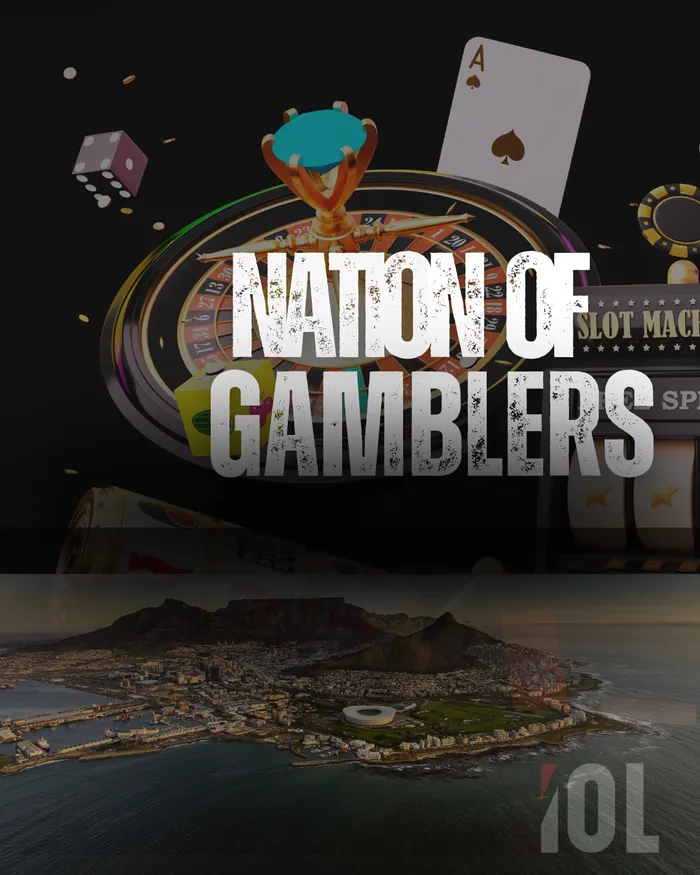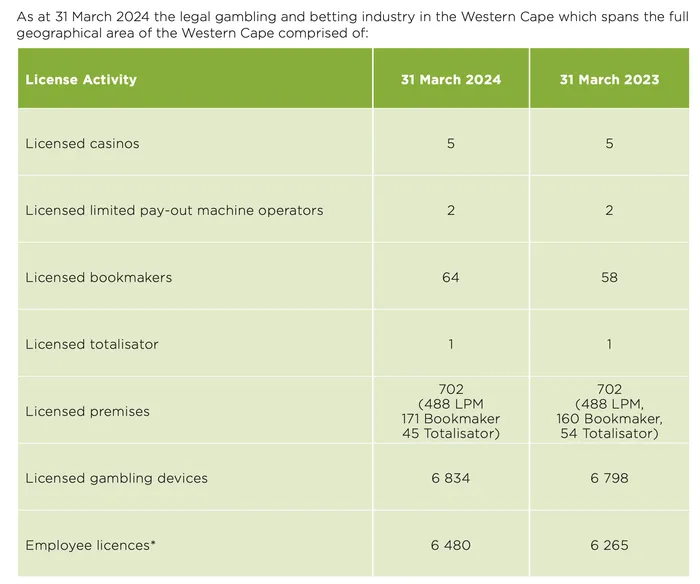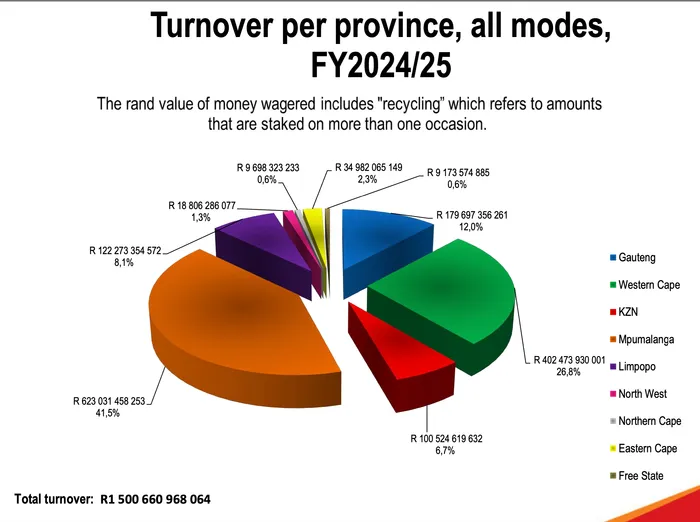The dark side of the Western Cape's R402bn gambling boom — and what’s driving it

According to the national gambling board’s latest report for the 2024/25 financial year, the Western Cape recorded R402.4bn in total wagers. The province's gross gambling revenue stood at R23.13bn.
Image: IOL Graphics
When Knysna resident Eileen and her husband packed up their belongings, sold their car, and moved in with her brother-in-law so they could rent out their house for extra income, she knew things had gone too far.
For years, the couple had worked hard to build a simple but happy life in the Garden Route town — even managing to buy their first home together.
“We worked hard for it,” Eileen said, asking that only her first name be used.
But what began as a bit of harmless fun — a few bets here and there — slowly spiralled out of control until both she and her husband became full-blown gambling addicts.
And as the debts piled up, arguments became routine and the life they had worked so hard for started slipping through their fingers.
“There was a point where I just didn’t recognise our life anymore,” said the mother of two, who now stays with her husband’s brother while they try to rebuild what they lost.
“I used to wake up every morning with this heavy feeling in my chest, wondering how we would make it through the month.
“Everything was going sideways because of something we couldn’t stop. I felt powerless.”
Eileen’s story is far from unique.
A series by IOL on problem gambling this week revealed how countless families are quietly battling the financial and emotional toll of addiction.
Across the Western Cape, gambling has grown into a booming industry.
In fact, the province has now overtaken Gauteng as SA’s gambling capital.
According to the National Gambling Board’s latest report for the 2024/25 financial year, the Western Cape recorded R402.4bn in total wagers — the highest of any province — while neighbouring Eastern Cape, often visited by Garden Route residents and holiday-makers, recorded R34.9bn.
The Western Cape's gross gambling revenue stood at R23.13bn
Betting and online platforms are driving this growth, with sports betting increasingly popular among players in both provinces.
Nationwide, R1.5tn was wagered across the country.
The wagered amounts includes "recycling” which refers to amounts that are staked on more than one occasion.
The gross revenue, excluding winning payouts, amounts to R74.5bn nationally.

The Western Cape has five licensed casinos and 58 bookmakers, according to March 2024 stats
Image: WCGB
Finance MEC Deidre Baartman, who oversees the Western Cape Gambling and Racing Board (WCGRB), said the rise in gambling in the province is linked to the way the industry has been regulated.
Speaking to IOL, she said the WCGRB allowed bookmakers to apply directly for licences or contingencies, instead of waiting for formal requests.
“Licences are issued subject to a thorough probity process and in consideration of responsible gambling objectives,” she said.
Baartman said this approach, along with "good governance and responsiveness to operators", has made the province attractive for both land-based and online gambling, including iGaming platforms.
She said the WCGRB monitors compliance and promotes responsible gambling through public awareness campaigns and by working with the SA Responsible Gambling Foundation to educate people about problem gambling, illegal gambling, and treatment options.
She also highlighted the economic importance of gambling.
Baartman said the sector was the “second most important own revenue source” for the province, helping fund provincial priorities and creating jobs in casinos, horse racing, and related industries.
Baartman said the province also relied on other sectors, such as finance, agriculture, and tourism, to ensure it is not overly dependent on gambling.
Looking ahead, Baartman said the province wanted to keep growing the sector while protecting players.
Casinos such as GrandWest in Cape Town, the Garden Route Casino in Mossel Bay, the Mykonos Casino in Langebaan, and the Boardwalk Casino in Gqeberha have seen tens of billions of rand flow through their tables and slot machines.
At the Boardwalk Casino, operations manager Keenan Burgins told IOL about 65,000 people visit the venue every month.
One self-confessed addict, who gambled for the past three years, said he lost hundreds of thousands of rand.
He said he nearly destroyed his life before seeking help.
“There came a moment when I realised I had nothing left — my savings were gone, I lied to my [pregnant] girlfriend, we were fighting constantly,” he said.
He then called the National Gambling Helpline.
And so bad is the overall situation that pawn shops from the Garden Route to Nelson Mandela Bay report that a large portion of their stock comes from people pawning items to fund gambling.
Mark Farrow, who used to own a pawn business in Cape Road, said: “I actually even went and sometimes I would deliver money at the casino for these people.
“It was very sad because they were always like, ‘oh no, I’m nearly there, I’m nearly there,’ and I wouldn’t see them again.”
He said gamblers usually sold upmarket goods such as jewellery and watches.
“Mind you, sometimes people actually used to pawn their cars," Farrow said.
“I’ve also got some heartbreaking stories. I had two bicycles come in and it was around Christmas time.
“They were still wrapped up in bubble wrap. They hadn’t even been gifted to the kids or anything. People wanted the money to sort of go and gamble.”
Adverts for gambling are also everywhere now, as betting companies have become major players in mainstream sport, sponsoring leagues and teams across the country.
Betway recently became the title sponsor of the Premier Soccer League after signing a three-year contract worth R900m.
Hollywoodbets continues to sponsor major cricket and rugby tournaments, while SunBet has partnerships with sports franchises and online gaming platforms.
According to the 2024 annual report from Sun International — which owns casinos including GrandWest, Carnival City, Time Square and the Boardwalk — the company earned R6.7bn from its urban casinos in the 2023/24 financial year.
SunBet, the group’s online betting and gaming arm, brought in an additional R1.2bn.
Tsogo Sun — which operates properties such as the Garden Route Casino, Hemingways and Montecasino — also reported strong growth in its betting and online divisions.

R1.5bn was wagered by South Africans in the 2024/25 financial year
Image: National Gambling Board
In the Eastern Cape, sports betting has become the biggest money-maker in the province’s gambling industry, overtaking traditional slot machines for the first time, according to the Eastern Cape Gambling Board.
Between April and September this year, the province generated about R436m in gross gambling revenue — an average of R72m a month.
Sports betting and other bookmaker activities made up more than a third of this income, while slot machines accounted for just over 30%, followed by bingo halls and limited payout machine sites contributing around 14%.
Traditional casino table games, horse racing and tote betting made up less than 6%.
The data also shows that there are five casinos in the province, with 2,027 slot machines, 1,815 limited payout machines, and 2,151 bingo machines across 15 licensed halls.
The province has 66 casino tables and 57 horse racing sites.
Monthly gambling revenue has remained steady, ranging between R68m and R76m, with May recording the highest earnings.
If the trend continues, the Eastern Cape’s gambling industry could bring in around R860m by the end of March 2026.
Many gamblers use stolen money to feed their addiction.
Eastern Cape criminal attorney Paul Roelofse said that over decades of defending clients in commercial crime courts he had repeatedly seen gambling addiction at the heart of serious fraud cases.
“The pattern is distressingly familiar,” he said.
“An otherwise upstanding individual — often a bookkeeper, financial manager or company director — falls into problem gambling. Debts mount, and they begin embezzling money in a misguided attempt to win it back.”
Roelofse said research showed that roughly half of problem gamblers commit crimes linked to their addiction.
“Most of these crimes are non-violent white-collar offences such as fraud, forgery, theft or embezzlement.
“Each time, what starts as a small misappropriation snowballs. Many of my clients are genuinely shocked when confronted with the total amount taken — some even insist it’s impossible they stole that much.”
A recent survey of nearly 400 members of Gamblers Anonymous found that 57% had admitted to theft to finance gambling.
Roelofse said many of his clients lost all sense of reality while chasing their losses.
“Caught in the downward spiral of ‘just one more bet’, they lose control. I’ve seen first-hand the havoc this causes to families and businesses.”
One of the most notorious local cases is that of Jonathan Blow, a Gqeberha chartered accountant who stole R52m from two SuperSpar outlets.
His gambling addiction spiralled out of control, leading to years of deceit before he was caught and sentenced to 22 years in prison.
In the Western Cape, a recent case echoed the same pattern.
In November 2024, 30-year-old Rudrees Yaseen Harris, a risk service coach from Cape Town, was sentenced to 10 years in prison after stealing more than R4.2m from online casino accounts while working for a company that managed gambling platforms.
Harris used his position to move money from legitimate customer accounts into his own, funding a gambling habit that quickly spiralled out of control.
Investigators found that he had transferred the stolen funds to friends and relatives to hide his tracks, but much of it had been lost through betting.
In court, Harris admitted that his gambling addiction had consumed him and that he had “lost sight of everything else.”
Mitchell’s Plain community leader Linda Jones said gambling had quietly become one of the most destructive forces in local families.
“It does affect some of our families very badly,” she said.
“You see mothers borrowing money for food because their sons or husbands have spent everything on betting. Some of our youngsters have reached rock bottom because of it.
“It seems harmless at first, but it’s just as bad as drugs. The problem is that it’s everywhere — on your phone, on TV, even on the sports your kids watch.
"I know of some youngsters who really got to deep into it and before realising they landed in trouble starting to borrow money lost and couldn't pay it back ... so it becomes their parents' problem and their parents knew nothing about it."
Sun International said it founded the National Responsible Gambling Programme (NRGP) 25 years ago to help problem gamblers.
"Today the NRGP is the flagship of the SA National Responsible Gambling Foundation and the funding it receives from all casinos and other gambling platforms is used to help problem gamblers," a spokesperson told IOL.
"The funding it receives from the industry assists the programme to run a 24/7 counselling helpline and WhatsApp platform for gamblers and their families to seek expert counselling and assistance."
While many South Africans gamble as a form of entertainment, and are able to do so responsibly, the minority who feel they need help are able to turn to the NRGP, the spokesperson said.
"All Sun International-owned properties are committed to further supporting the NRGP by prominently displaying its responsible gambling messaging across casino floors, on all casino advertising and on other forms of communication with customers.
"Casino staff also undergo regular mandatory NRGP training in order to identify and handle problem gambling issues."
For help to quit gambling, call the the South African Responsible Gambling Foundation on its toll free counselling line, 0800-006-008 Or WhatsApp/SMS HELP To 076-675-0710 or email to helpline@responsiblegambling.org.za
IOL News